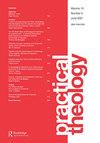The Three Sisters: the first three Beatitudes as guiding an embodied response to the discovery of the unmarked graves at residential schools across Canada in 2021
IF 0.4
0 RELIGION
引用次数: 0
Abstract
ABSTRACT Using the Indigenous Three Sisters gardening technique as a guiding metaphor, this paper will explore a wholly embodied response to the disturbing headlines of the discovery of hundreds of unmarked graves at residential schools across Canada in 2021. Just as the Indigenous Three Sisters cooperate together for mutual flourishing, the Beatitudinal trio of humility, grief, and meekness will be promoted as characteristics of a wholly embodied response to this specific issue and the large issue it represents, which is an oppressive and troubled historic relationship between Indigenous and white settlers. This paper will use Terry A. Veiling’s double exegetical approach of ‘on earth as it is in heaven’ as the underlying practical theology framework. Perspectives of various Indigenous Canadian theologians along with hopeful stories of white settler Canadian church leaders whose performative and incarnational responses resemble the three sisterly Beatitudes will be included throughout. I see the flourishing of the Three Sisters together as a helpful and practical metaphor for the Canadian church as we consider how humility, grief, and meekness can help us neighbour well with Indigenous people.三姐妹:前三福分作为对2021年加拿大寄宿学校发现无标记坟墓的具体回应的指导
本文将以原住民三姐妹园艺技术为指导隐喻,探索对2021年加拿大寄宿学校发现数百个无名坟墓这一令人不安的头条新闻的全面体现。就像土著三姐妹为了共同繁荣而合作一样,谦卑、悲伤和温顺的幸福三重奏将被提升为对这个具体问题和它所代表的大问题的完全体现的特征,这个问题是土著和白人定居者之间压迫和麻烦的历史关系。本文将以泰利·维林的“在地上如同在天上”的双重解经方法作为基本的实践神学框架。各种加拿大土著神学家的观点,以及加拿大白人移民教会领袖的充满希望的故事,他们的表演和化身的反应类似于三姐妹的八福,将贯穿始终。我认为,当我们思考谦卑、悲伤和温柔如何帮助我们与原住民和睦相处时,三姐妹的共同繁荣,对加拿大教会来说是一个有益而实用的比喻。
本文章由计算机程序翻译,如有差异,请以英文原文为准。
求助全文
约1分钟内获得全文
求助全文

 求助内容:
求助内容: 应助结果提醒方式:
应助结果提醒方式:


